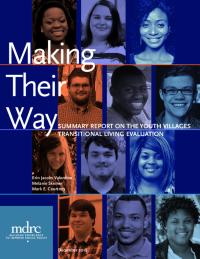Making Their Way
Summary Report on the Youth Villages Transitional Living Evaluation

 Young adults with histories of foster care or juvenile justice custody experience poor outcomes across a number of domains, on average, relative to their peers. While government funding for services targeting these young people has increased in recent years, research on the effectiveness of such services is limited, and few of the programs that have been rigorously tested have been found to improve outcomes.
Young adults with histories of foster care or juvenile justice custody experience poor outcomes across a number of domains, on average, relative to their peers. While government funding for services targeting these young people has increased in recent years, research on the effectiveness of such services is limited, and few of the programs that have been rigorously tested have been found to improve outcomes.
The Youth Villages Transitional Living Evaluation tested whether the Transitional Living program, operated by the social service organization Youth Villages, makes a difference in the lives of young people with histories of foster care or juvenile justice custody. The program, which was renamed “YVLifeSet” in April 2015, is intended to help young people make a successful transition to adulthood by providing intensive, individualized, and clinically focused case management, support, and counseling.
The evaluation used a rigorous random assignment design and is set in Tennessee, where Youth Villages, which is committed to building evidence that could help improve its effectiveness, operates its largest Transitional Living program. Researchers worked with the program, which did not have the resources to enroll all the young people in need of its services, to randomly assign more than 1,300 eligible young people to either a program group, which was offered the Transitional Living program services, or to a control group that was not offered those services. Using survey and administrative data, the evaluation team measured outcomes for both groups over time to assess whether Transitional Living services led to better outcomes for the program group compared with the control group’s outcomes. This report, which draws from earlier reports, summarizes the main findings from the evaluation.
The Transitional Living program was well implemented, and a substantial portion of program group members received services at the expected dosage. The program group also received substantially more services than the control group. In the first year of follow-up, the program improved outcomes in three of the six domains that it was designed to affect. It boosted earnings, increased housing stability and economic well-being, and improved some outcomes related to health and safety. However, the program did not improve outcomes in the areas of education, social support, or criminal involvement.
Longer-term data were only available to assess two-year impacts in three of the original six domains: education, employment and earnings, and criminal involvement. During the second year of follow-up, Transitional Living did not increase young people’s average earnings, but it did have a modest, positive effect at some earnings levels and it led to modest increases in employment and earnings over the full two-year study period. Statistically significant impacts in the education and criminal involvement domains did not emerge in Year 2, spurring Youth Villages’ ongoing efforts to strengthen its program offerings in these areas.
These results indicate that the Transitional Living program can improve some short-term outcomes for young adults with histories of foster care or juvenile justice custody, a notable finding given the paucity of documented positive effects for programs that serve these populations. It will be critically important to build on these initial successes to help secure the future life outcomes of participants.






